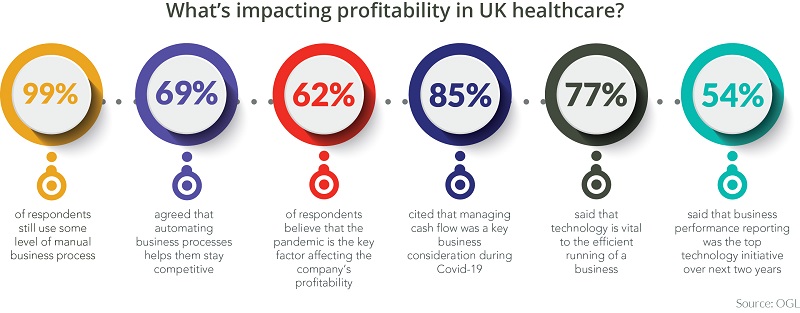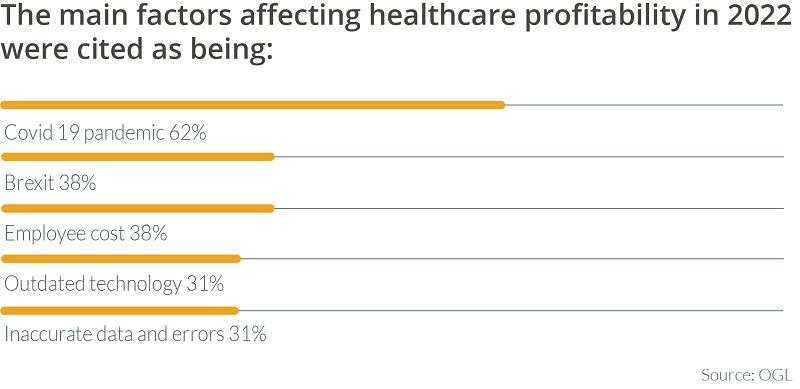A new survey commissioned by OGL Group reveals that COVID, Brexit, and employee cost are the greatest factors affecting profitability for healthcare businesses.
The research focused on companies that distribute healthcare products, including pharmaceuticals, diagnostic equipment, personal protective equipment (PPE), first aid kits, toiletries, and cleaning supplies to healthcare providers and commercial businesses.
With annual healthcare expenditure representing 12.8% gross domestic product (GDP) in the UK in 2020, the UK medical device market is the third largest in Europe, behind Germany and France, and the sixth largest in the world, valued at $9.5billion in 2015.
And the market is poised to grow at a CAGR of 5% by 2026, making the healthcare product and medical supply distribution marketplace one that is also expanding.
But the COVID-19 pandemic and Brexit have hit supply chains hard and driven many businesses to online sales.
Exacerbated by stock management pressures, firms in the healthcare sector are citing their top technology priorities for the next 12-24 months as business performance reporting (54%), managing inventory (46%), and creating and updating websites (46%).
The five main factors affecting sector profitability in 2022 were cited as the COVID-19 pandemic (62%), Brexit (38%), employee cost (38%), outdated technology (31%), and inaccurate data (31%).
Back in 2019, when OGL conducted the same survey, respondents cited Brexit as the main factor at 75%, followed by manual processes and outdated technology at 50% each.
Digging deeper into Coronavirus and its effects, respondents’ business priorities were to have a core business software that can be easily adapted to new business models (92%), flexible employees (92%), cashflow management (85%), and improved sales strategies and routes to market (85%).
The pandemic has also led to supply chain shortages, so some healthcare businesses are stockpiling products and parts to ensure supply to clients.
But manual processes are still plaguing many businesses, with 62% citing them as a problem that slow down their business efficiency and inability to correctly assess performance and sales.
As the UK enters another potentially-uncertain economic period with continuing supply-chain issues, the Ukraine-Russia war, cost of living and fuel price rises, efforts to increase profitability will prove critical.

The OLG survey looked at the key issues impacting on profitability within the supply chain
And technology is at the heart of this, with 77% of respondents agreeing that technology is vital to the efficient running of their business, and 69% stating that automating business processes helps their companies stay competitive.
Another key finding of the research was the wide variety of technologies used and the disparate nature of systems that are not necessarily talking to each other to provide a full view of operations.
More than 95% of respondents said they use one or more software systems, from inventory/stock control to accounting software, customer relationship management (CRM), and enterprise resource planning (ERP); and 69% listed the main reason to integrate their disparate systems into a single ERP system as helping them to achieve their growth plans without taking on additional overheads, followed by 62% citing removing duplication of work across different departments, and 46% citing reduced administration time, thanks to improved efficiencies by improved accuracy of information (38%).
Survey respondents confirmed that eCommerce has grown exponentially, with 92% stating that being able to sell products online easily is important to them.
Additionally, 85% of respondents stated that using an eCommerce platform was an effective tool for managing business operations.
Cloud computing also became a driver for change during the pandemic, with 77% of respondents agreeing that hosting applications and data in the cloud have improved efficiencies and productivity, or would improve them if cloud was implemented.
But, despite the benefits of this approach, concerns about security remain (54%) with healthcare businesses failing to realise that many cloud-based apps, such as ERP, offer enhanced security features to ensure that customer data remains protected.
Digital transformation has no doubt saved many businesses that have pivoted to online sales and it’s heartening to reveal that 92% agreed that ERP systems provide greater visibility and control of stock
Critically, ERP systems are a key technology, with 54% agreeing they give greater visibility and control of stock.
Positively, the number of respondents thinking that ERP systems are for large enterprises only was just 38%, down from 50% in 2019.

Brexit and outdated technology were also key factors cited by respondents
The main barriers to deploying an integrated software solution were fear of change, finding a reputable provider, and identifying the right time to migrate, with 38% citing these as factors, followed by 31% citing business disruption, and 31% struggling to find a solution that is right for their business.
Charlie Grant, head of operational product development at OGL Software, said of the findings: “In October 2019, we had no idea that we were in the eye of a huge storm.
“Since then, the business model for the entire healthcare supplies sector has evolved quickly, with our 2022 survey identifying several changes, including the pandemic and stock availability which impacted profitability; the drop in concerns about security of cloud computing; and the growing realisation that ERP systems are not solely for large enterprises.
“Digital transformation has no doubt saved many businesses that have pivoted to online sales and it’s heartening to reveal that 92% agreed that ERP systems provide greater visibility and control of stock, especially as part of a multi-channel sales strategy.”




